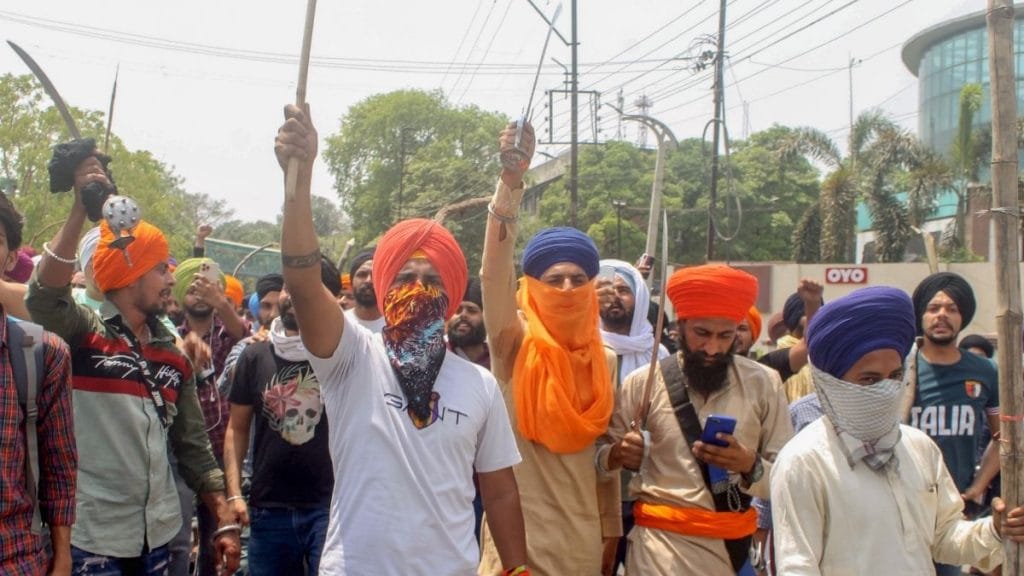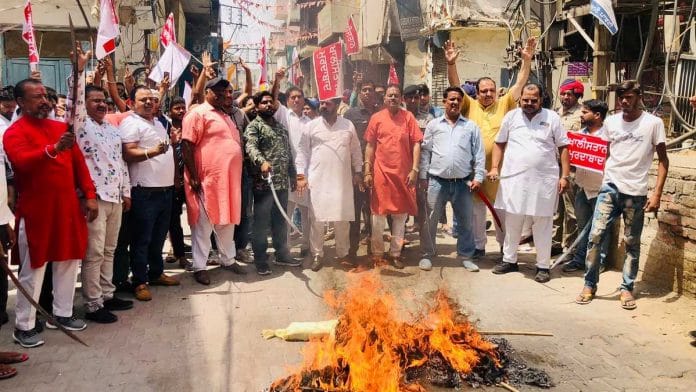Patiala: The violent clashes between Sikh and Hindu groups over an “anti-Khalistan” demonstration in Patiala last Friday has thrown the spotlight on the Shiv Sena, which reportedly called for the rally, in Punjab.
However, it’s not quite that straightforward: There are many homegrown Shiv Senas in the state, apparently with no link to the Maharashtra-based Shiv Sena other than their name.
Hours after Friday’s violence, the police arrested Harish Singla, who claimed to be the working president of the Shiv Sena (Bal Thackeray) in the state. Reports soon followed that he was expelled from the party, which is the Punjab unit of the Maharashtra-based Shiv Sena.
But, why the need for a suffix? According to Yog Raj Sharma, party head in Punjab, it was a must because of the surfeit of other unrelated Shiv Senas in the state.
“We have to specify that we are part of the Shiv Sena that was founded by Balasaheb Thackeray in Maharashtra,” Sharma told ThePrint.
“There are 15-16 fake Shiv Senas in Punjab that have no recognition, no registration, have nothing to do with our Mumbai office, but still carry our name,” he added. Sharma, who reportedly described Singla as state vice-president of the party earlier, sought to distance it from the rally, which he described as Sharma’s personal initiative.
Punjab’s Shiv Senas of unclear moorings include the Shiv Sena (Hindu), Shiv Sena (Punjab), Shiv Sena (Taksali), Shiv Sena (Hindustan), Shiv Sena (Sher-E-Hind), Shiv Sena (Sher-E-Punjab), and Shiv Sena (Samajwadi), to name a few.
According to Sharma as well as Punjab Congress and Akali Dal leaders who did not wish to be named, these self-styled Shiv Senas have no political legitimacy, do not contest elections, and have no purpose other than to instigate conflicts with Sikh groups.
However, even though most of these Shiv Senas are minor fringe operators, several of them enjoy state-sanctioned security. Singla, for instance, had X-category security at the time of his arrest. This, political observers claim, allows them to demonstrate a degree of clout and also to make incendiary statements with impunity.
So, how did this plethora of Shiv Senas come into being and what function do they perform?
Also Read: As the dust settles, festering differences that led to Patiala violence come to light
The rise of Punjab’s ‘Shiv Senas’
In the turbulent mid-1980s, during the days of the Khalistani militancy — when the Ram Janmabhoomi issue was gaining momentum as well — two distinct political currents coalesced around Hindu identity in north India.
While the Rashtriya Swayamsevak Sangh (RSS) claimed to be the voice of Hindus everywhere in the country, it was the Shiv Sena that took on this mantle in Punjab, according to a 1986 report published in India Today.
The Shiv Sena in Punjab was quite distinct from its older namesake in Maharashtra, which was founded in 1966 by Bal Thackeray.
While both the Shiv Senas took a hardline Hindutva stand, Maharashtra’s Shiv Sainiks (soldiers) drew inspiration from the 17th-century Maratha warrior-ruler Chhatrapati Shivaji. Their Punjab counterparts, meanwhile, styled themselves as sainiks of Lord Shiva, one of the most important Hindu gods.
Further, while the Maharashtra Shiv Sena primarily took a combative stand against Muslims and outsiders in the 1980s, Punjab’s positioned themselves largely against the Sikhs.
Also, right from the get-go, Punjab’s Shiv Sena comprised several factions.
One of the early leaders of the so-called Ludhiana faction was Jagdish Tangri, who was arrested along with several others for possessing weapons — reportedly “hundreds of swords” and many daggers and guns — in 2002. Tangri was sentenced to three years in prison in 2011, but died in 2013 at the age of 80.
In an interview last year, his son, Sunil Tangri, who was also sentenced in the arms case, described the origins of the Shiv Sena in Punjab: “In 1980-81, we had founded this party under the name of lord Shiva, in keeping with our religious beliefs,” he said.
Sunil Tangri now heads a political party called the Akhil Bhartiya Shivsena Rashtrawadi, which has contested, and lost, two Lok Sabha polls from Bathinda (2009 and 2014). It also contested four assembly seats in 2002 and two in 2007, losing them all.

That’s the only electoral history that any of Punjab’s homegrown Shiv Senas have.
According to Gurmeet Singh Sidhu, professor of religious studies at Punjabi University, Patiala, the state’s Shiv Senas are all “communal outfits” that lack political legitimacy.
“The Shiv Sena is a political party in Maharashtra… but there is no such political branding of the Shiv Sena in Punjab,” Sidhu said.
Nevertheless, the name has remained and has been appropriated by a number of ‘organisations’ whose exact function and relationship to the ‘original’ Shiv Sena have been known to cause confusion.
What do modern-day Shiv Sainiks in Punjab do?
The ‘original’ Shiv Sena and even Sunil Tangri’s Akhil Bhartiya Shivsena Rashtrawadi have complained about the Shiv Senas of uncertain provenance floating around Punjab.
“Present-day Punjab’s so-called Shiv Sainiks do not do anything for the public, they are too busy satisfying their own egos,” state president of the party Yog Raj Sharma told ThePrint.
“During the lockdown, the Shiv Sena did a commendable job in providing relief to the people, but these people have done nothing. The real Shiv Sainik raises people’s issues, be it inflation or power cuts, but these guys only chant about non-issues and make controversial statements,” he added.
In the interview cited earlier, Sunil Tangri complained that the self-styled Shiv Sainiks in Punjab were “lazy” and not interested in taking up causes that affected the people. Instead, he claimed, they were mired in the past and were still preoccupied with militancy even though it was no longer a pressing issue.
This assessment is not far off the mark — what all the motley Shiv Sainiks of Punjab have in common is their constant rhetoric against the Khalistan separatist movement, which was a burning issue from the 1980s to the early 1990s but is currently down to its embers.
On the various Facebook pages run by Punjab’s Shiv Sainiks, something of a pattern emerges: first, they will decry Khalistan, often using sharp invective, and then share local news articles about receiving threats from Sikh radicals.
The veracity of these claims is not guaranteed — for instance, several members of the Shiv Sena (Hind) were arrested in 2017 for allegedly cooking up stories about receiving threats.
The question now arises — why go through all the trouble?
In the 2017 case, the motive for fabricating threats was reportedly a desire to get more police security.
This wish still prevails across the various Shiv Senas, according to Yog Raj Sharma. “They have a modus operandi — shout against the Sikhs, then say we are being threatened, and then use this to get security from the police,” he alleged.
So, why such a desire for more security?
For fringe groups that no political parties take very seriously, a security cover could fulfil various functions, including an aura of importance and protection, should their rabble-rousing backfire, Sharma said.
“It’s not that they feel unsafe as such… When they go out in public, if there are 10-15 cops moving along with them — it legitimises their cult, Sharma added.
On top of this, he said, having a solid security cover gives Shiv Sainiks more leeway to provoke and instigate.
“They can hit someone without a thought, but nobody can hit them with so many policemen around. The day this government withdraws their security, these guys will not be able to get out of their bathrooms,” Sharma added.
Singla reportedly enjoyed X-level security, which comprises two armed police personnel. Sudhir Suri, a Shiv Sena (Taksali) leader, as of 2020, had an impressive security cover of 15 police personnel. For Amit Arora of the Shiv Sena (Punjab), the police reduced his security detail from four to two earlier this year after he complained of receiving threats.
However, as borne out by the violence in Patiala, fringe groups like Punjab’s Shiv Senas have the potential to do real harm even if they lack political support, experts believe.
“When you have a dwindling economy and angry youngsters who are either leaving the country or are frustrated here, there is a chance that they may get mobilised and vent their anger,” Dr Ajai Sahni, executive director of the Delhi-based Institute for Conflict Management, told ThePrint. “Punjab doesn’t have a history of communal clashes but it doesn’t mean that the youth can’t be misguided.”
According to Sahni, even though the Shiv Senas have an insignificant following in the state, “all it needs is a spark to light a fire”.
“There is a rise in elements trying to polarise society. These elements have to be sorted out,” he said. “Punjab currently sits on a tinderbox — you can’t strike matchsticks in such a situation.”
(Edited by Asavari Singh)
Also Read: Religious intolerance main driver of insurgency in Punjab of 1980s. State’s watching it again






